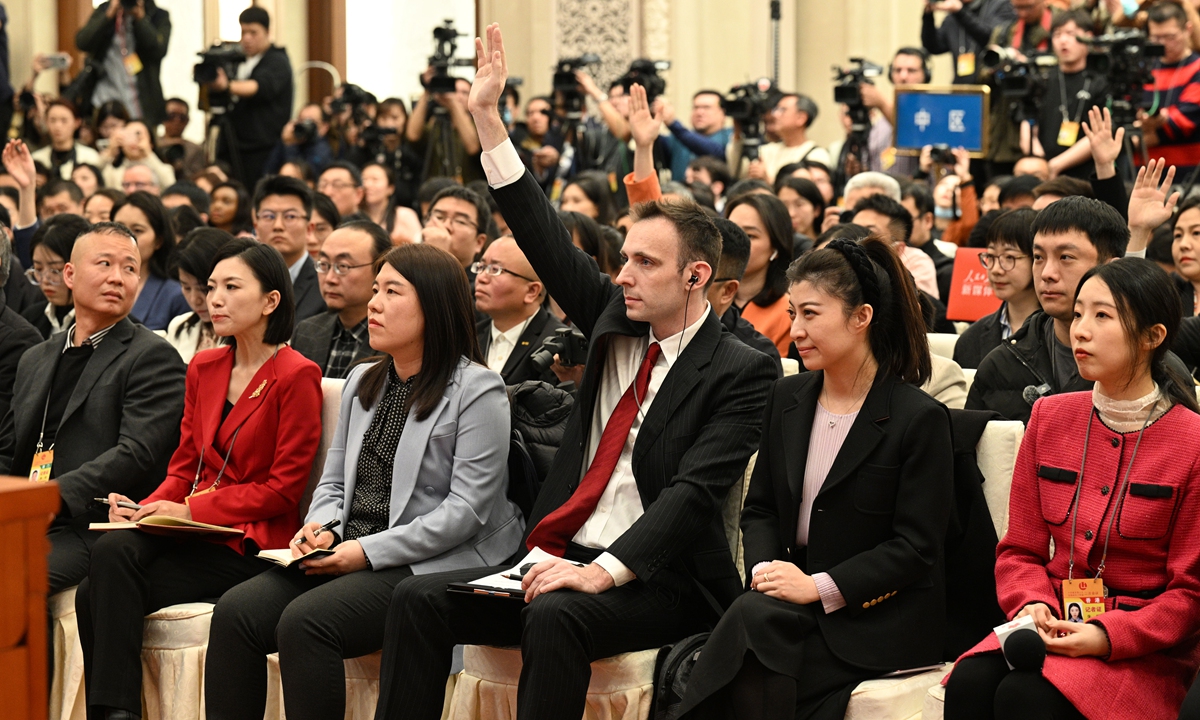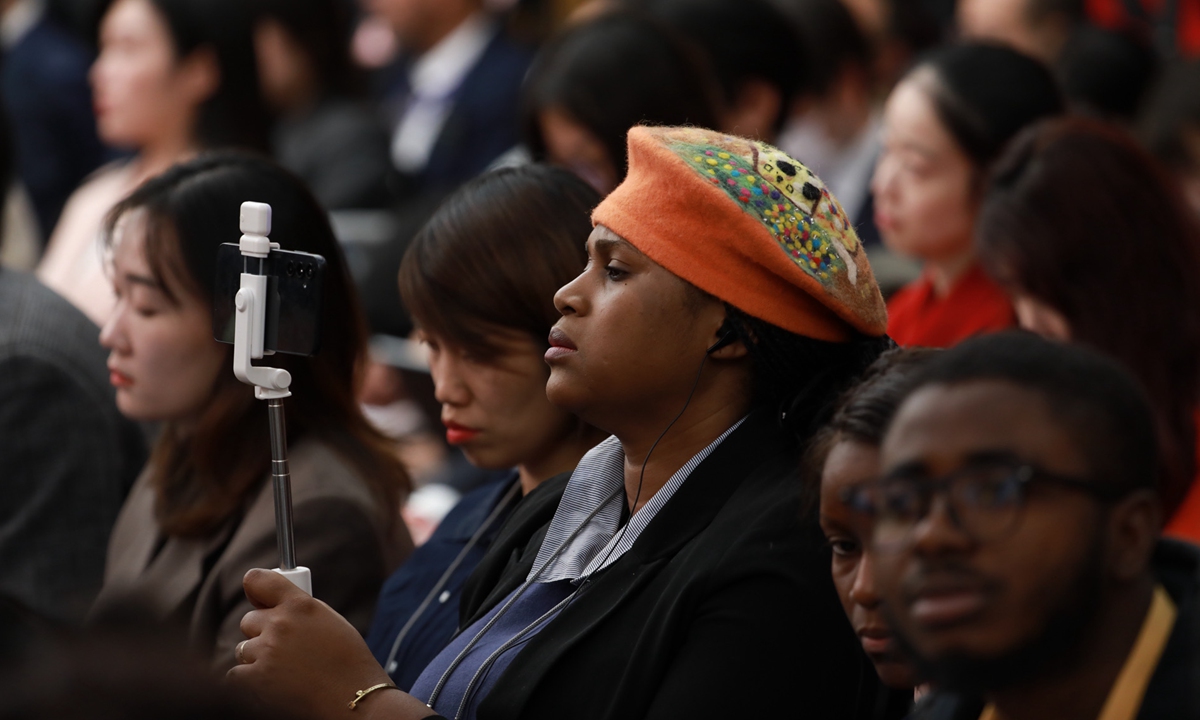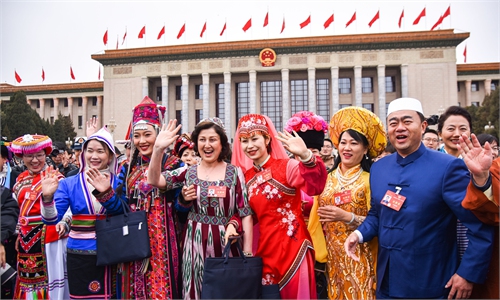Two sessions attract international attention; China’s development boost world’s confidence for global recovery

A foreign journalist raises his hand to ask a question at the news conference for the second session of the 14th CPPCC National Committee at the Great Hall of the People in Beijing on March 3, 2024. More than 3,000 reporters from home and abroad have registered to report on this year's two sessions, a significant increase compared to previous years. Photo: VCG
International media outlets and foreign diplomats are paying high attention to the ongoing two sessions as they are eager to learn - from the country's annual political events - the latest information about China, a vibrant powerhouse for the global recovery and a significant stabilizer in a world filled with turbulence.The two sessions, where China's national lawmakers and political advisors discuss and set social and economic development goals for the year, is a key window for the world to learn about and understand China, the terms like "new quality productive forces," "high-quality development," "Chinese modernization," and "major-country diplomacy with Chinese characteristics" are becoming the hot phrases broadly discussed and reported by foreign media and observers.
Chinese analysts said China today is closely connected and intertwined with the world, and shares a common future. They noted that this is why other countries around the globe are looking forward to seeing China's high-quality development and opening-up because these will bring opportunities for the global economic growth. Chinese modernization will provide fruitful experiences and knowledge to the countries which are exploring the path for their future development, especially the ones from the Global South, the analysts said.
Eyes on China
Foreign ambassadors reached by the Global Times are paying high attention to the two sessions, especially on the topics about development, economic policy and environmental protection.
This is the third year that South African Ambassador to China Siyabonga Cwele was invited to attend the two sessions. Cwele said that it will help him to learn more about China's economic and policy trend.
"I believe that the cooperative relationship between South Africa and China will continue to grow, which is not only reflected in the economic and trade fields," but also about cooperation with Chinese companies in tackling climate change. I think the cooperative relationship between our two countries will definitely be getting better and better," he told the Global Times.
Maltese Ambassador to China John Busuttil told the Global Times that "I have been in China for one year but it is the first time I attended the two sessions. I was very impressed with the choreography of the whole meeting."
According to the Government Work Report that Chinese Premier Li Qiang delivered on Tuesday, China will set a target of economic growth at about 5 per cent this year, a rate that analysts have described as "ambitious."
"I would hope, and I expect, that China will achieve this target, especially if stronger efforts are made by the international community to defuse geopolitical tensions and allow globalization, and supply chains, to flourish again," said Busuttil.
"The global economy is not in a good place right now and China's growth would be welcomed to everyone, especially for us Europeans," the Maltese ambassador said.
Iven Zyuulu, Zambian ambassador to China, said the two sessions are very important meetings. This policy formulation is also an issue of participation, with so many people involved in terms of the economic policymaking, he was quoted as saying in media reports. It's also a process of learning (from China) how China formulates those policies related to areas such as economy, social livelihoods and environmental protection.
Assem Hanafi, the Egyptian ambassador to China, told the media that he hopes to learn and understand China's policies in consolidating and enhancing the positive trend of economic recovery in 2024 through the two sessions. A prosperous and developing China is in the interest of the world, and the prosperity and stability of the world are also opportunities for China, he told the news portal website haiwainet.cn under the People's Daily.
Hanafi said Egypt participates in the China-proposed Belt and Road Initiative and has become a formal member of the BRICS countries, so the deepening cooperation between Egypt and China has more platforms. Egypt appreciates China's efforts to promote unity among "Global South" countries, and no country should be left behind in the world's modernization process, and all countries should share the dividends of development and work together, he said.
Ambassador of Bolivia to China Hugo Jose del Prado told state broadcaster China Central Television that China, as a member of the Global South and a key player in the multipolar world, is contributing new concepts of international relations to the world. Bolivia agrees with China's principles on international issues, so it is very important for diplomats like him to be able to participate in the two sessions, and he believes that he and his colleagues will learn a lot and benefit greatly from attending the two sessions.

A foreign journalist uses mobile phone to livestream the press conference on China's economy for the second session of the 14th National People's Congress in Beijing on March 6, 2024. Photo: VCG
Media attentionsApart from diplomats, the two sessions always attract attention from international media, and this year, many journalists from the Global South are covering the events, and they have showed a very different angle compared with their counterparts from the West.
Colum Murphy, a Bloomberg reporter, shared in a recent post on X platform that there's a noticeable increase in foreign journalists traveling in from overseas to cover the two sessions. "I heard reporters saying this was the first time they'd been given a visiting journalist visa by China after years of trying," he said in the post.
While Western media from countries like the US and the UK have always tried to misinterpret the information to exaggerate the difficulties that China's development is facing or spreading negative atmosphere about China's society and economy based on prejudiced and biased reports, journalists from the Global South are keen to report more pragmatically and objectively.
Igor Calian, a Brazilian journalist from TV Bandeirantes, who shared his feelings about the two sessions at the Great Hall of the People with the Global Times said that he felt the vitality of the Chinese society and is confident of China's economic growth in the future. China's economy is very strong, and the exchanges and cooperation with China are very important for Brazil's development, he said.
Some believe that China's economic development is currently encountering obstacles. However, the reality is that China is in the mid of a significant transition from traditional industries to cutting-edge technology sectors. The country's advancements in new-energy and electric vehicles, particularly in the Arab world, serve as a testament to China's promising economic future, Helena, a journalist from China Arab TV, told the Global Times on Monday.




